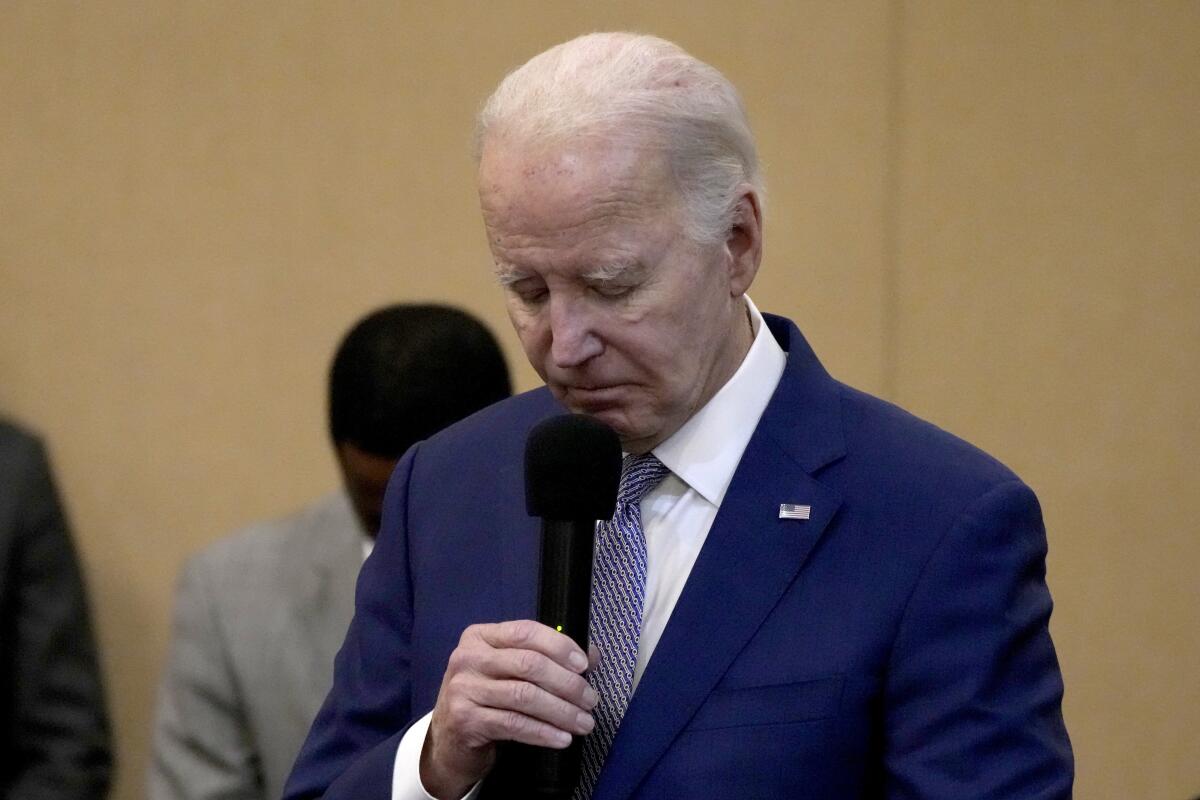Drone attack in Jordan complicates Biden’s effort to contain Israel-Hamas war

- Share via
BEIRUT — A drone strike early Sunday that killed three U.S. service members and wounded dozens more is threatening to upend the Biden administration’s delicate effort to prevent the Israel-Hamas war from spiraling into a broader regional conflict or direct confrontation with Iran.
In the more than three months since Hamas killed at least 1,200 Israelis in a surprise attack and Israel responded with a punishing invasion of the Gaza Strip that has left more than 26,000 dead, President Biden has tried to keep hostilities from spreading in the restive region.
Before Sunday, U.S. bases in Syria and Iraq had been the targets of some 160 attacks by Iran-backed militias angry over American support for Israel and Israel’s attacks on Gaza. But despite numerous injuries to American troops in those strikes, the administration has avoided strong retaliation or counterattacks, with the notable exception of U.S. airstrikes against Houthi rebels who claimed responsibility for a string of maritime missile attacks in the Gulf of Aden.
Sunday’s deadly drone attack along the Jordan-Syria border may alter that approach, forcing Biden to find a way to respond without sparking a regionwide showdown with Iran.
Also complicating the task were reports Monday —first appearing in the Wall Street Journal — that U.S. forces protecting operations in the region may have mistaken the enemy drone for a U.S. one that was returning to its base about the same time. Believing it was an American drone, they allowed it to cross unchallenged to the base, Associated Press said Monday.
A Pentagon spokeswoman declined to comment on the reports and said it was still investigating the drone strike, including the possibility of human error.
Central to the question Biden now faces is what role Iran played in the strike, which marked the first time American troops have been killed by hostile fire in the region since the start of the war.
The attack was claimed by the Islamic Resistance in Iraq, a catch-all label for a variety of Iranian-backed militias operating in Iraq and Syria. A statement released Sunday night said it was part of a trio of strikes on U.S. bases in the region and came “in response to the Zionist entity’s massacres against our people in Gaza.”
Biden blamed “radical Iran-backed militant groups,” adding that the government was still “gathering the facts” of what he described as a “despicable and wholly unjust” attack.
“Have no doubt,” he concluded, “we will hold all those responsible to account at a time and in a manner of our choosing.”
Speaking to NBC News on Monday, U.S. National Security Council spokesman John F. Kirby said the attack had the “earmarks” of a group or groups supported by Kataib Hezbollah, a powerful Iraqi paramilitary faction that is a major player in the regionwide network of militants backed by Iran. It includes Hamas, Palestinian Islamic Jihad, the Houthi rebels in Yemen and Lebanon’s Hezbollah.
Kataib Hezbollah members have fought alongside the Iraqi army against Islamic State militants since 2016, but have also operated in Syria in support of the government there.
The group has long engaged in a low-grade tussle with U.S. forces, whose military presence in Iraq and Syria it considers an occupation. There are about 2,500 U.S. soldiers in Iraq and 900 in Syria as part of the counter-Islamic State mission. Kataib Hezbollah has launched harassment attacks aimed at forcing Washington to withdraw its troops.
Biden’s first military act as president came in 2021 after a Kataib Hezbollah rocket barrage killed a civilian contractor and wounded a number of service members on a base in Iraq.
Kirby said the U.S. is “not looking for a war with Iran.”
“We are not looking to escalate the conflict in the region. Obviously, these attacks keep coming. We’ll keep looking at the options,” he said.
“What we want is a stable, secure, prosperous Middle East, and we want these attacks to stop.”
For its part, Tehran distanced itself from Sunday’s attack. In a news conference Monday, Iranian Foreign Minister Nasser Kanaani rejected Biden’s statement as “baseless accusations,” saying that “resistance groups” take no orders from Iran and that Tehran has “no involvement” in their decisions.
Kanaani suggested the attack was orchestrated by forces seeking to provoke the U.S. and drag it into the conflict.
Biden is already coming under pressure from Republicans to respond. They say his “weak” policies in the Middle East have been interpreted as a green light to attack U.S. targets.
Sen. Lindsey Graham (R-S.C.) said that the administration’s policy of deterrence had “failed miserably” and that the U.S. armed forces had to attack inside Iran to have impact.
“Hit Iran now,” he said in a statement. “Hit them hard.”
Such action could have dire consequences by escalating deadly violence exponentially, analysts say.
One possible alternative would be a strike that targets a single Iranian leader or members of the proxy groups.
“Iran doesn’t want an all-out war — they cannot win it,” said Rajan Menon, strategy program director for Defense Priorities, a think tank that advocates for more restrained foreign policy. “But that doesn’t mean they don’t have a lot of buttons to push” that can roil the global economy, lead to many deaths and destabilize the region.
U.S. officials are anxious about sparking more violence.
“I would argue that we have not seen a situation as dangerous as the one we are facing now across the region since at least 1973,” Secretary of State Antony J. Blinken said Monday, after a day of meetings with senior Arab leaders and the secretary general of the North Atlantic Treaty Organization.
Details on Sunday’s early morning attack remain scant, but it appears to have been the work of a single drone, which struck the barracks in Tower 22, a base that lies within a series of Jordanian army-run border observation points on the country’s northeastern tip near Iraq and Syria.
Satellite images of the outpost and its surroundings published by Planet Labs on Sunday depict a grouping of bunkers, helipads and sleeping and dining quarters for troops against an arid desert backdrop. Some 8,000 displaced Syrians reside in the nearby Rukban camp.
A source who until recently worked in a senior headquarters overseeing operations in Tower 22 said there had been numerous drone fly-bys at the outpost and the nearby Tanf Garrison, including before October. The base has counter-drone defenses.
The attack comes days after Washington held its first talks with Baghdad on the future of U.S. and coalition troops in that country.
Iraqi officials have for years pushed to reduce the U.S. presence — calls that were intensified after a U.S. strike in January killed the top commander of a Shiite faction in Baghdad.
Iraqi Prime Minister Mohammed Shia al-Sudani is reported to be considering completely ending the coalition presence in Iraq. An American retaliation that involved strikes on Iraqi soil is likely to empower anti-American voices in Iraq.
The fallout affects Jordan too. The government there, a staunch U.S. ally, faces a wave of anti-American fervor over Washington’s refusal to call for a cease-fire in Gaza. Jordanian officials have long downplayed U.S. military presence in the country; until Sunday, the existence of Tower 22 and the presence of U.S. troops there was a secret.
One option, espoused by many Middle East leaders and echoed on Monday by Qatari Prime Minister Sheikh Mohammed bin Abdulrahman al Thani, is bringing about a cease-fire in Gaza.
“We’ve warned since Day 1 this war has a potential of expanding and spilling over in the region ... and we’re seeing this building up in the last three months and a half,” he said.
Whatever choice the Biden administration makes, said Thanassis Cambanis, a senior fellow at the Century Foundation think tank, the U.S. is already embroiled in a regional war.
“We’re in a limited war, which is certainly better than total war, but we’re one or two miscalculations away from spiraling completely out of control,” he said.
“Was it brilliant calibration by the resistance factions that no one was killed before, or was it luck?” he said.
“It was luck. And now, as was inevitable, luck has changed.”
Wilkinson reported from Washington.
More to Read
Sign up for Essential California
The most important California stories and recommendations in your inbox every morning.
You may occasionally receive promotional content from the Los Angeles Times.












